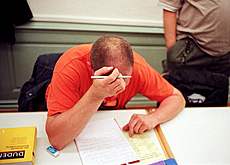One in six adults lacks basic literacy

A large number of adults living in Switzerland cannot read and understand a simple text or even hold a conversation in the local language, according to a report.
But the Federal Statistics Office said on Tuesday that although one in six people aged 16-65 has trouble reading, illiteracy was falling.
The federal office’s analysis of last year’s “Adult Literacy and Lifeskills Survey” showed that a large proportion of working-age people lacked basic skills.
Around 16 per cent could not read well enough to understand a simple text, while eight per cent could not speak the local language well enough to hold a conversation.
It added that women fared less well than men when dealing with maths but that there was no gender gap in reading.
The number of foreigners – more than a quarter of the Swiss adult population – is a major factor in the results. Those who moved to Switzerland in the past five years are usually well educated, while earlier generations only had basic schooling.
Older immigrants in French- and Italian-speaking Switzerland account for lower reading skills, while in the German-speaking part of the country their lack of knowledge of the local language stands out.
New immigrants on the other hand are far more qualified than their predecessors and their skills tend to mirror those of locals when they share the same language. The latest arrivals also tend to master more languages than the average Swiss citizen.
The report also concluded that people with good skills usually have good positions and are less likely to lose their jobs. They also read more books and take part more readily in group and community activities.
They have access to computers and other modern communications technology and make use of them. They also consider themselves to be generally healthier.
Slight improvement
Compared with a similar study carried out in the 1990s, literacy skills have changed little, although results showed a slight improvement in German-speaking Switzerland.
There was however a drop in the number of truly bad results associated with illiteracy.
While age is the main factor in determining a person’s skills, comparing the two surveys shows that being born at a time when education was less developed also has a major impact.
The survey was published last year by the Paris-based Organisation for Economic Cooperation and Development (OECD). It compared literacy in six countries – Switzerland, Canada, the United States, Norway, Italy and Bermuda – as well as the Mexican state of Nuevo Leon.
The survey measured skills in prose and document literacy, numeracy and problem solving. Switzerland came fourth in reading and comprehension skills, first in mathematics and second in problem solving.
swissinfo with agencies
In Switzerland, around 800,000 adults are considered functionally illiterate, meaning they find it diffcult to read or write.
An illiterate person will normally have had little or no schooling, but a functionally illiterate person has normally completed compulsory schooling.
More than 5,000 people between the ages of 16 and 65 were tested in Switzerland for the Lifeskills survey in 2003.

In compliance with the JTI standards
More: SWI swissinfo.ch certified by the Journalism Trust Initiative











You can find an overview of ongoing debates with our journalists here . Please join us!
If you want to start a conversation about a topic raised in this article or want to report factual errors, email us at english@swissinfo.ch.